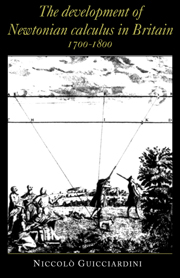Book contents
- Frontmatter
- Contents
- Introduction
- OVERTURE: NEWTON'S PUBLISHED WORK ON THE CALCULUS OF FLUXIONS
- PART I THE EARLY PERIOD
- PART II THE MIDDLE PERIOD
- PART III THE REFORM
- 7 SCOTLAND (1785–1809)
- 8 THE MILITARY SCHOOLS (1773–1819)
- 9 CAMBRIDGE AND DUBLIN (1790–1820)
- CONCLUSION
- APPENDIX A TABLES OF CONTENTS OF FLUXIONARY TEXTBOOKS
- APPENDIX B PRICE LIST OF MATHEMATICAL BOOKS PRINTED FOR JOHN NOURSE
- APPENDIX C CHAIRS IN THE UNIVERSITIES
- APPENDIX D MILITARY ACADEMIES
- APPENDIX E SUBJECT INDEX OF PRIMARY LITERATURE
- APPENDIX F MANUSCRIPT SOURCES
- Notes
- Bibliography
- Index
7 - SCOTLAND (1785–1809)
from PART III - THE REFORM
Published online by Cambridge University Press: 14 September 2009
- Frontmatter
- Contents
- Introduction
- OVERTURE: NEWTON'S PUBLISHED WORK ON THE CALCULUS OF FLUXIONS
- PART I THE EARLY PERIOD
- PART II THE MIDDLE PERIOD
- PART III THE REFORM
- 7 SCOTLAND (1785–1809)
- 8 THE MILITARY SCHOOLS (1773–1819)
- 9 CAMBRIDGE AND DUBLIN (1790–1820)
- CONCLUSION
- APPENDIX A TABLES OF CONTENTS OF FLUXIONARY TEXTBOOKS
- APPENDIX B PRICE LIST OF MATHEMATICAL BOOKS PRINTED FOR JOHN NOURSE
- APPENDIX C CHAIRS IN THE UNIVERSITIES
- APPENDIX D MILITARY ACADEMIES
- APPENDIX E SUBJECT INDEX OF PRIMARY LITERATURE
- APPENDIX F MANUSCRIPT SOURCES
- Notes
- Bibliography
- Index
Summary
the next three chapters are devoted to the attempts at reforming the calculus which were made in the late eighteenth century and early nineteenth century. The first location to which our attention is drawn is Scotland, where it was more likely that there were contacts with the continent. A geometric tradition was alive in Glasgow and Edinburgh, but this did not hinder several Scottish mathematicians from appreciating the importance of the ‘analysis’ elaborated by the continentals. John Playfair played a significant role in promoting the study of analytical mathematics. In his lectures on physical astronomy in Edinburgh he certainly introduced a taste of the new techniques of Laplace. Perhaps more influential were his reviews and historical accounts concerning the development of mathematics in which he was extremely critical of the fluxional tradition. His call for a change was taken up by two young Scots, Wallace and Ivory. Their researches on elliptic integrals, motivated by Landen (1775), led them to appreciate Legendre's work. I conclude the chapter with a few notes on a quite obscure outsider, William Spence, who adopted in the early nineteenth century the differential notation and, more importantly, some algebraical methods of Arbogast.
The universities and the Royal Society of Edinburgh
Mathematics was taught in all four of the Scottish universities. There were Chairs of Mathematics at Glasgow, Aberdeen, St Andrews and Edinburgh.
- Type
- Chapter
- Information
- The Development of Newtonian Calculus in Britain, 1700–1800 , pp. 95 - 107Publisher: Cambridge University PressPrint publication year: 1989



